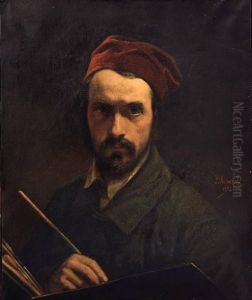Joseph Aubanel Paintings
Joseph Aubanel was a French painter known for his Provençal landscapes and scenes of rural life. Born on February 1, 1849, in Avignon, France, Aubanel grew up in a region celebrated for its light and color, which would greatly influence his artistic direction. He belonged to a family with artistic ties, his father being a printer and his uncle a well-known poet, Théodore Aubanel, a member of the Félibrige, a society dedicated to preserving the language and culture of Provence.
Educated locally, Aubanel later moved to Paris to further his studies in art. He was a student at the École des Beaux-Arts, where he honed his skills in painting and drawing. His style was significantly influenced by the Barbizon school, which emphasized painting landscapes en plein air (outdoors). This approach allowed him to capture the transient effects of light and atmosphere in his work, a technique that would become a hallmark of the subsequent Impressionist movement.
Throughout his career, Aubanel exhibited his work at various salons and galleries, receiving positive recognition from critics and the public alike. His paintings often depicted the countryside of Provence, with its rolling hills, vineyards, and traditional rural life. He was adept at capturing the distinct colors of the region, from the vibrant blues of the sky to the rich greens and purples of the vegetation.
Despite his success, Aubanel never achieved the same level of fame as some of his contemporaries, such as Claude Monet or Vincent van Gogh. However, his contributions to the representation of the Provençal landscape have been noted by art historians as an important part of the region's cultural heritage.
Joseph Aubanel passed away on July 10, 1924, in Avignon. His works continue to be appreciated for their beauty and historical value, offering a window into the life and environment of 19th-century Provence.
